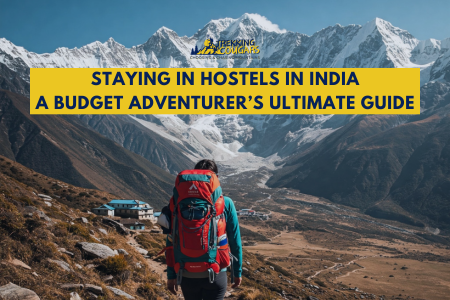How Difficult is the Gaumukh Tapovan Trek?
- November 1, 2025
- Blog
The Gaumukh Tapovan trek is one of the most breathtaking journeys in the Himalayas. Here, the mountains don’t just stand tall in... Read More

India’s untamed trails, roaring rivers, and mist-clad peaks are a magnet for trekkers, hikers, and thrill-seekers. But let’s be real: adventure travel can burn through your budget faster than a monsoon downpour. Enter hostels, the budget traveler’s secret weapon. From rustic mountain hideouts to lively urban hubs, here’s the raw, unfiltered scoop on why hostels could be your perfect (or occasionally imperfect) travel partner.
Why Hostels Are a Win for Adventure Travelers
1. Budget Bliss for Thrifty Explorers
Hostels are a lifeline for travelers counting every rupee. Snag a dorm bed in Himalayan hubs like Manali or Rishikesh for as little as ₹300–₹500 a night—cheaper than a meal at a touristy café! This leaves more cash for essentials like trekking permits, gear rentals, or a hearty post-hike plate of Maggi.
Pro Tip: Many hostel chains and booking platforms offer seasonal discounts, especially in offbeat regions.
2. Instant Adventure Squads
Hostels are social goldmines. Picture this: You’re lounging in a common area in Kasol when a solo traveler invites you to join their sunrise hike to Kheerganga. Suddenly, you’ve got a crew! Many hostels organize bonfires, group treks, or even stargazing nights—ideal for forging bonds with fellow adventurers.
3. Gateway to the Wild
Location is everything. Hostels in Himachal Pradesh often sit minutes from paragliding sites, while those in McLeod Ganj are a stone’s throw from iconic trails like Triund. Skip the pre-dawn taxi rides—wake up, grab your gear, and hit the path!
4. Insider Secrets You Won’t Find Online
Hostel staff are treasure troves of local wisdom. The owner of a cozy hostel in Leh might reveal a hidden monastery trail, while a Spiti Valley stay could connect you with guides for the Chandratal Lake trek. Some even rent camping gear or arrange village homestays for off-grid experiences.
5. Eco-Friendly Stays Without the Price Tag
For eco-warriors, hostels in regions like Tirthan Valley often run on solar power, serve organic meals, and promote waste reduction. Perfect for travelers who want their adventures to leave footprints on trails, not the planet.
The Flip Side: Challenges of Hostel Life
1. Dorms Aren’t for Introverts
Sharing a room with strangers means zero privacy. After a grueling hike, you might crave solitude—opt for a private room (though it’ll cost extra) or scout hostels with smaller dorms.
2. Sleep? Good Luck!
Between midnight jam sessions and early trekkers rustling gear, rest isn’t guaranteed. Look for hostels with enforced “quiet hours” in towns like Pushkar or Rishikesh.
Survival Hack: Earplugs are a backpacker’s best friend.
3. Amenities Vary Wildly
While some hostels flaunt chic lounges and hot showers, budget options in remote areas might have basic facilities—think bucket baths or patchy Wi-Fi. Always check recent guest reviews before booking.
4. Safety First
Most hostels have lockers, but crowded dorms can tempt petty theft. Many hostels in Goa or Rishikesh offer women-only dorms with added security—a hit among solo female travelers.
5. Peak Season Madness
Hostels in hotspots like Ladakh or Sikkim overflow during the summer. For quieter vibes, visit during shoulder months (April or October) when trails are serene, and prices drop.
Pro Hacks for a Smooth Hostel Experience
Final Take: Hostels vs. Hotels
For adventurers chasing stories over luxury, hostels are unbeatable. Sure, you’ll swap plush towels for mountain views from a rooftop bunk. Yes, you might bond with a stranger over chai instead of binge-watching Netflix. But isn’t that the magic of travel?
Whether you’re conquering Hampta Pass or chasing waterfalls in Meghalaya, hostels keep your journey affordable, authentic, and packed with stories. So, sling that backpack, book a bunk, and let India’s wild heart sweep you away—one hostel at a time!
Join The Discussion